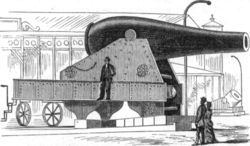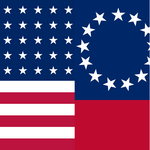Portal:American Civil War
Portal:American Civil War
Jump to navigation
Jump to search
Portal maintenance status: (December 2018)
Please take care when editing, especially if using automated editing software, and seek consensus before making major changes. Learn how to update the maintenance information here. |
 |  |


 The American Civil War Portal
The American Civil War Portal

A Rodman gun exhibited at the 1876 U.S. Centennial

The American Civil War (1861–1865) was a sectional rebellion against the United States of America by the Confederate States, formed of eleven southern states' governments which moved to secede from the Union after the 1860 election of Abraham Lincoln as President of the United States. The Union's victory was eventually achieved by leveraging advantages in population, manufacturing and logistics and through a strategic naval blockade denying the Confederacy access to the world's markets.
In many ways, the conflict's central issues – the enslavement of African Americans, the role of constitutional federal government, and the rights of states – are still not completely resolved. Not surprisingly, the Confederate army's surrender at Appomattox on April 9, 1865 did little to change many Americans' attitudes toward the potential powers of central government. The passage of the Thirteenth, Fourteenth and Fifteenth amendments to the Constitution in the years immediately following the war did not change the racial prejudice prevalent among Americans of the day; and the process of Reconstruction did not heal the deeply personal wounds inflicted by four brutal years of war and more than 970,000 casualties – 3 percent of the population, including approximately 560,000 deaths. As a result, controversies affected by the war's unresolved social, political, economic and racial tensions continue to shape contemporary American thought. The causes of the war, the reasons for the outcome, and even the name of the war itself are subjects of much discussion even today.


 Featured article
Featured article

William Tecumseh Sherman was an American soldier, businessman, educator and author. He served as a General in the Union Army during the American Civil War, for which he received recognition for his outstanding command of military strategy as well as criticism for the harshness of the "scorched earth" policies that he implemented in conducting total war against the Confederate States. Military historian Basil Liddell Hart famously declared that Sherman was "the first modern general".
Sherman served under General Ulysses S. Grant in 1862 and 1863 during the campaigns that led to the fall of the Confederate stronghold of Vicksburg on the Mississippi River and culminated with the routing of the Confederate armies in the state of Tennessee. In 1864, Sherman succeeded Grant as the Union commander in the western theater of the war. He proceeded to lead his troops to the capture of the city of Atlanta, a military success that contributed to the re-election of President Abraham Lincoln. Sherman's subsequent march through Georgia and the Carolinas further undermined the Confederacy's ability to continue fighting. He accepted the surrender of all the Confederate armies in the Carolinas, Georgia, and Florida in April 1865.
When Grant became president, Sherman succeeded him as Commanding General of the Army (1869–83). As such, he was responsible for the conduct of the Indian Wars in the western United States. He steadfastly refused to be drawn into politics and in 1875 published his Memoirs, one of the best-known firsthand accounts of the Civil War.


 Grand Parade of the States
Grand Parade of the States

Michigan made a substantial contribution to the Union war effort. While far removed from the fighting in the war, Michigan supplied a large number of troops and several generals, including George Armstrong Custer. When, at the beginning of the war, Michigan was asked to supply no more than four regiments, Governor Austin Blair sent seven.
More than 90,000 Michigan men, nearly a quarter of the state's male population in 1860, served in the war. In addition to the approximately 600 men who joined the Union Navy, Michigan raised 34 regiments of infantry volunteers, one regiment of sharpshooters, eleven cavalry regiments, one engineer regiment, and numerous small independent units.
Among the more celebrated units was the 24th Michigan Volunteer Infantry, which, as a part of the famed Iron Brigade, suffered considerable losses at the Battle of Gettysburg while defending McPherson's Ridge. George Armstrong Custer's "Michigan Wolverine" Cavalry effectively battled J.E.B. Stuart at Gettysburg on the East Cavalry Field. Several Union generals hailed from Michigan, including: Custer, Elon J. Farnsworth, Orlando Metcalfe Poe, Israel Bush Richardson, and Orlando B. Willcox.


 Selected biography
Selected biography
Bruce Catton (October 9, 1899 – August 28, 1978) was a journalist and a notable historian of the American Civil War. He won a Pulitzer Prize for history in 1954 for A Stillness at Appomattox, his study of the final campaign of the war in Virginia.
Catton was known as a narrative historian who specialized in popular histories that emphasized the colorful characters and vignettes of history, in addition to the simple dates, facts, and analyses. His works, although well-researched, were generally not presented in a rigorous academic style, supported by footnotes. In the long line of Civil War historians, Catton is arguably the most prolific and popular of all, with Shelby Foote his only conceivable rival. Oliver Jensen, who succeeded him as editor of American Heritage magazine, wrote: "There is a near-magic power of imagination in Catton's work that seemed to project him physically into the battlefields, along the dusty roads and to the campfires of another age."


 WikiProjects
WikiProjects
- Military history WikiProject
- American Civil War task force
- United States military history task force
- United States WikiProject
- History WikiProject
- Biography WikiProject


 Selected picture
Selected picture

David Dixon Porter, who served as an admiral for the Union and later as Superintendent of the US Naval Academy


 Did you know...
Did you know...
- ... that eighteen fallen Confederate soldiers were moved when the Confederate Monument in Georgetown was dedicated?
- ... that key donors of land to Louisville, Kentucky's 26-mile parkway system included a veteran of the Confederate Army and a notorious political boss?
- ... that residents of Indianapolis came to the aid of Confederate prisoners of war at Camp Morton, providing food, clothing, and nursing?


 Subcategories
Subcategories
▼ American Civil War
► American Civil War by state
► American Civil War-related lists
► 1861 in the American Civil War
► 1862 in the American Civil War
► 1863 in the American Civil War
► 1864 in the American Civil War
► 1865 in the American Civil War
► Aftermath of the American Civil War
► American Civil War task force members
► American Civil War timelines
► Black Confederates
► Child soldiers in the American Civil War
► Confederate States of America
► Cultural history of the American Civil War
► Economic history of the American Civil War
► Ulysses S. Grant
► Historiography of the American Civil War
► American Civil War by location
► Military history of the American Civil War
► Military units and formations of the American Civil War
► American Civil War on the National Register of Historic Places
► Northern-born Confederates
► Origins of the American Civil War
► People of the American Civil War
► Politics of the American Civil War
► Secession crisis of 1860–61
► Social history of the American Civil War
► American Civil War stubs
► American Civil War navigational boxes


 American Civil War topics
American Civil War topics


 Things you can do
Things you can do
- Attention needed
...to referencing and citation • ...to coverage and accuracy • ...to structure • ...to grammar • ...to supporting materials- Popular pages
- Full list
- Cleanup needed
- The West Tennessee Raids
- Requested articles
Ebenezer Magoffin • Henry Maury • James Ashby (soldier) • Albemarle Cady • Benjamin D. Fearing • Charles A. Hickman • Richard Henry Jackson • John Love • Peter S. Michie • Thomas Grimke Rhett • James B. Speers • Charles S. Steedman • Battle of Barton's Station • Battle of Camp Davies • George Peabody Estey • Lawrence P. Graham • Joseph Hayes (general) • Lewis Cass Hunt • Thomas John Lucas • Sullivan Amory Meredith • William Reading Montgomery • Charles Hale Morgan • Byron Root Pierce • Calvin Edward Pratt • Daniel Henry Rucker • Friend Smith Rutherford • Gustavus Adolphus Smith • James Hughes Stokes • William Kerley Strong • Frederick S. Sturmbaugh • William B. Tibbits • Davis Tillson • Adin Ballou Underwood • Francis Laurens Vinton • Louis Douglass Watkins • William Denison Whipple • Requested American Civil War Medal of Honor recipients
- Expansion needed
Battle of Boonsborough • Battle of Cabin Creek • Battle of Fort Sumter II • Battle of Guard Hill • Battle of Middle Boggy Depot • Battle of Rice's Station • Battle of Simmon's Bluff • Battle of Summit Point • Battle of Yellow Bayou • Charleston Arsenal • Edenton Bell Battery • Elmira Prison • First Battle of Dalton • Samuel Benton • Blackshear Prison • Orris S. Ferry • Edwin Forbes • Hiram B. Granbury • Henry Thomas Harrison • Ben Hardin Helm • Louis Hébert (colonel) • Benjamin G. Humphreys • Lunsford L. Lomax • Maynard Carbine • Daniel Ruggles • Thomas W. Sherman • Hezekiah G. Spruill • Smith Percussion Carbine • Edward C. Walthall • Confederate States Secretary of the Navy • Confederate States Secretary of the Treasury • David Henry Williams • Battle of Rome Cross Roads • Henry Boynton Clitz • Delaware in the American Civil War • Ironclad Board • United States Military Railroad • Kansas in the American Civil War • Salisbury National Cemetery • Other American Civil War battle stubs • Other American Civil War stubs
- Images needed
Battle of Lone Jack • James S. Rains • Preston Pond, Jr. • Melancthon Smith • Franklin Stillman Nickerson • Thomas Gamble Pitcher • William H. Penrose • Lewis B. Parsons Jr. • Isaac Ferdinand Quinby • James W. Reilly • Isaac F. Shepard • Francis Trowbridge Sherman • James R. Slack • Joseph Pannell Taylor • Henry Goddard Thomas • James Henry Van Alen • Melancthon S. Wade • James M. Warner
- Merging needed
1st Regiment New York Mounted Rifles and 7th Regiment New York Volunteer Cavalry
- Citations needed
1st Alabama Cavalry Regiment (Union) • 4th Maine Battery • 33rd Ohio Infantry • 110th New York Volunteer Infantry • Battle of Hatcher's Run • Battle of Grand Gulf • Camp Dennison • Confederate colonies • CSS Resolute • Dakota War of 1862 • Florida in the American Civil War • Ethan A. Hitchcock (general) • Fort Harker (Alabama) • Gettysburg (1993 film) • Iowa in the American Civil War
- Translation needed
- Add an article here!


 Associated Wikimedia
Associated Wikimedia
Shortcuts to this page: Portal:ACW • P:ACW
Categories:
- American Civil War portal
- Military and war-related portals
- United States portals
- American Civil War
(window.RLQ=window.RLQ||).push(function(){mw.config.set({"wgPageParseReport":{"limitreport":{"cputime":"0.556","walltime":"0.729","ppvisitednodes":{"value":2388,"limit":1000000},"ppgeneratednodes":{"value":0,"limit":1500000},"postexpandincludesize":{"value":328773,"limit":2097152},"templateargumentsize":{"value":19286,"limit":2097152},"expansiondepth":{"value":21,"limit":40},"expensivefunctioncount":{"value":3,"limit":500},"unstrip-depth":{"value":0,"limit":20},"unstrip-size":{"value":13686,"limit":5000000},"entityaccesscount":{"value":0,"limit":400},"timingprofile":["100.00% 442.208 1 -total"," 22.02% 97.363 11 Portal:American_Civil_War/box-header"," 21.23% 93.882 11 Template:Box-header"," 18.91% 83.641 1 Portal:American_Civil_War/American_Civil_War_topics"," 18.46% 81.641 1 Template:American_Civil_War"," 17.32% 76.570 1 Template:Navbox_with_collapsible_groups"," 15.19% 67.171 1 Template:Portal_maintenance_status"," 13.48% 59.601 9 Template:Navbox"," 11.47% 50.716 5 Template:Portal_other"," 10.50% 46.435 1 Template:Ombox"]},"scribunto":{"limitreport-timeusage":{"value":"0.142","limit":"10.000"},"limitreport-memusage":{"value":4850406,"limit":52428800}},"cachereport":{"origin":"mw1272","timestamp":"20190110040902","ttl":3600,"transientcontent":true}}});mw.config.set({"wgBackendResponseTime":88,"wgHostname":"mw1245"});});

